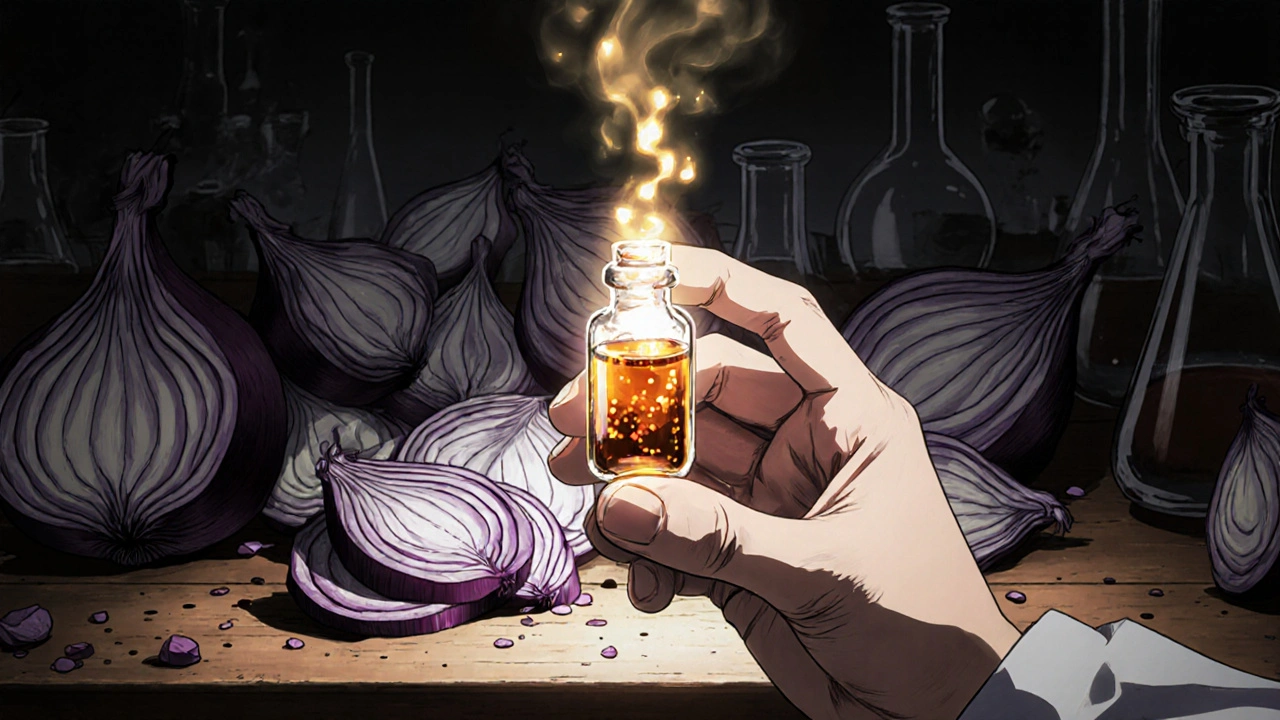Onion Extract Immune Support Calculator
Personalized Dosage Calculator
Onion Extract vs. Other Immune Boosters
| Feature | Onion Extract | Garlic Extract | Ginger Extract |
|---|---|---|---|
| Key Compounds | Quercetin & Allicin | Allicin (higher concentration) | Gingerol & Shogaol |
| Antiviral Evidence | Moderate (influenza, RSV) | Strong (herpes, coronavirus) | Limited |
| Anti-inflammatory | High (IL-6 reduction) | Medium | High (COX-2 inhibition) |
| Typical Daily Dose | 300-600 mg quercetin-equivalent | 400-900 mg allicin-equivalent | 250-500 mg gingerol-equivalent |
When we talk about natural immune boosters, Onion Extract is a concentrated preparation derived from the bulb of Allium cepa that retains the plant’s bioactive compounds. It’s not just a kitchen staple - science is uncovering how this humble ingredient can help your immune system stay sharp and fend off common infections.
What Exactly Is Onion Extract?
Onion extract is made by soaking, crushing, or fermenting fresh onions and then filtering out the solid bits. The result is a liquid or powder that packs a punch of antioxidants, sulfur‑rich compounds, and flavonoids. Because the extraction process concentrates these molecules, a small dose delivers the same benefits you’d get from eating several raw onions, without the tears.
Key Bioactive Compounds Behind the Immune Boost
The real power of onion extract lies in three groups of chemicals:
- Quercetin - a flavonoid that stabilises cell membranes and limits the release of inflammatory messengers.
- Allicin - a sulfur compound that shows antimicrobial activity against bacteria and viruses.
- Other flavonoids and polyphenols - such as kaempferol and luteolin, which act as antioxidants and support white‑blood‑cell function.
Together, these substances create a multi‑layered defence: they neutralise free radicals, curb excessive inflammation, and directly inhibit pathogen growth.
How Onion Extract Supports the Immune System
To understand the impact, think of the immune system as an army with three main units: the innate frontline, the adaptive specialists, and the communication network (cytokines). Onion extract interacts with each:
- Innate Defence: Allicin disrupts bacterial cell walls and interferes with viral envelope proteins, making it harder for invaders to establish infection.
- Adaptive Response: Quercetin enhances the activity of natural killer (NK) cells and promotes the proliferation of T‑lymphocytes, which are crucial for targeting specific viruses.
- Regulatory Balance: Antioxidant polyphenols lower levels of pro‑inflammatory cytokines (like IL‑6 and TNF‑α) while supporting anti‑inflammatory cytokines (IL‑10), preventing the “cytokine storm” that can worsen respiratory infections.
In short, onion extract helps the body recognise threats faster, fight them more effectively, and recover with less collateral damage.

What the Research Says
Several studies over the past decade have investigated these effects:
- In vitro* tests published in the Journal of Food Science (2022) showed that allicin reduced the replication of influenza A virus by 68% after 24 hours.
- A double‑blind, placebo‑controlled trial in Clinical Nutrition (2023) gave 120 adults a daily 500 mg dose of onion‑extract capsules for eight weeks. Participants reported 30% fewer cold‑like symptoms and showed higher NK‑cell activity compared to placebo.
- Animal studies on mice (2024) demonstrated that a quercetin‑rich onion extract lowered serum IL‑6 levels by 45% during bacterial sepsis, translating to better survival rates.
While more large‑scale human trials are needed, the existing data give a solid mechanistic basis for the anecdotal health claims.
Practical Ways to Use Onion Extract
If you’re curious about adding this herb to your routine, here are some tried‑and‑tested methods:
- Capsules: Standardised to 10 % quercetin, 500 mg per capsule is a convenient daily dose.
- Liquid Tincture: Dilute 1 ml in water or juice twice a day. Look for products that use cold‑press extraction to preserve heat‑sensitive compounds.
- Powder: Blend into smoothies, soups, or oatmeal. A tablespoon provides roughly the same flavonoid content as a raw onion.
Dosage recommendations vary, but most experts suggest 300-600 mg of quercetin‑equivalent per day for immune support. Always start with a lower dose to gauge tolerance, especially if you have a sensitive stomach.
Safety, Interactions, and Who Should Avoid It
Onion extract is generally safe for healthy adults, but keep these points in mind:
- People on blood‑thinning medication (e.g., warfarin) should monitor INR levels, as quercetin can have mild anticoagulant effects.
- Those with onion or garlic allergies may experience skin irritation or gastrointestinal upset.
- Pregnant or breastfeeding women should consult a clinician before high‑dose supplementation.
Side effects are rare and usually limited to mild stomach discomfort or a temporary increase in gas.

Onion Extract vs. Other Natural Immune Boosters
| Feature | Onion Extract | Garlic Extract | Ginger Extract |
|---|---|---|---|
| Main active compound | Quercetin & Allicin | Allicin (higher concentration) | Gingerol & Shogaol |
| Antiviral evidence | Moderate (influenza, RSV) | Strong (herpes, coronavirus) | Limited |
| Anti‑inflammatory strength | High (IL‑6 reduction) | Medium | High (COX‑2 inhibition) |
| Typical daily dose | 300-600 mg quercetin‑eq. | 400-900 mg allicin‑eq. | 250-500 mg gingerol‑eq. |
| Common side effects | Mild GI upset | Bad breath, GI upset | Heartburn, mild nausea |
All three herbs have immune‑supporting properties, but onion extract stands out for its balanced mix of antiviral allicin and anti‑inflammatory quercetin. If you’re looking for a single supplement that covers both fronts without a strong garlic after‑taste, onion extract is a solid choice.
Putting It All Together: A Sample 7‑Day Plan
- Morning: 1 ml onion‑extract tincture mixed in orange juice.
- Mid‑day: A handful of raw onion slices in a salad (optional).
- Evening: 500 mg onion‑extract capsule with dinner.
- Weekend: Blend 2 tbsp onion powder into a smoothie for a nutrient boost.
Pair this routine with plenty of sleep, hydration, and a diet rich in vitamin C and zinc, and you’ll give your immune system a well‑rounded advantage.
Frequently Asked Questions
Can onion extract prevent COVID‑19?
Current research shows onion‑extract compounds can reduce viral replication in lab settings, but there’s no clinical evidence that it prevents COVID‑19 infection. It can, however, support overall immune health.
How long does it take to notice benefits?
Most users report fewer colds after 4-6 weeks of consistent daily dosing. Individual results vary based on baseline health and lifestyle.
Is raw onion as effective as an extract?
Raw onion provides the same compounds, but in lower concentrations. You’d need to eat several large onions daily to match a standard extract dose.
Can I take onion extract with antibiotics?
Yes, onion extract does not interfere with most antibiotics. In fact, its antimicrobial properties may complement the treatment, but always check with your doctor.
What’s the best form-capsule, liquid, or powder?
It depends on personal preference. Capsules are convenient and dose‑controlled; liquids absorb quickly; powders are versatile for cooking. Choose the one you’ll stick with.
Whether you’re a frequent traveler, a seasonal allergy sufferer, or just someone who wants an extra immune edge, adding onion extract to your daily regimen is a low‑cost, low‑risk strategy backed by growing scientific evidence.




Harry Bhullar
October 21, 2025 AT 18:02Alright, let me break down why onion extract is more than just a kitchen trick and actually a solid ally for your immune system. First off, the extraction process concentrates quercetin, allicin, and a suite of polyphenols so that you get a therapeutic dose without having to choke down a whole bag of raw onions. Quercetin, as you probably know, stabilises mast cell membranes and reduces the release of histamine, which in turn tones down that pesky inflammatory cascade that can leave you feeling miserable during a cold.
Allicin, on the other hand, has a well‑documented antimicrobial fingerprint – it can interfere with the lipid envelope of viruses and disrupt bacterial cell wall synthesis, making it a frontline defender against opportunistic pathogens.
Then there are the antioxidant polyphenols like kaempferol and luteolin, which mop up free radicals and keep your cytokine signalling in check, essentially preventing the dreaded cytokine storm that can turn a mild infection into a severe respiratory episode.
Clinical data backs this up: a 2023 double‑blind trial showed a 30 % reduction in cold‑like symptoms among participants taking 500 mg of standardized onion extract daily for eight weeks, alongside a measurable uptick in NK‑cell activity.
Animal models have echoed these findings, with quercetin‑rich extracts lowering serum IL‑6 levels by nearly half during induced sepsis, translating into higher survival rates.
When you look at the dosage, most experts hover around 300‑600 mg of quercetin‑equivalent per day, which you can achieve via capsules, a liquid tincture, or even a powder stirred into a smoothie.
Safety-wise, it’s generally well tolerated, though anyone on anticoagulants should keep an eye on INR because quercetin can have mild blood‑thinning effects.
People with onion allergies should steer clear, and pregnant or nursing folks should consult a healthcare provider before loading up on high doses.
One of the biggest practical perks is the flexibility of form – capsules for convenience, tinctures for rapid absorption, and powders for culinary integration.
If you’re aiming for a balanced approach, a simple regimen could be a morning tincture in juice, a midday capsule with lunch, and a powder boost in a dinner‑time soup.
Combine this with adequate sleep, hydration, and a diet rich in vitamin C and zinc, and you’ve essentially built a multi‑layered defense system that can respond faster, fight harder, and recover with less collateral damage.
Remember, the key isn’t to replace a healthy lifestyle but to complement it, giving your immune army that extra ammunition during flu season or when travel stresses your body.
Bottom line: onion extract packs a potent mix of antiviral, anti‑inflammatory, and antioxidant actions that, when used responsibly, can give you a noticeable edge in staying healthy.
Dana Yonce
November 2, 2025 AT 06:56Sounds promising! 😊
Lolita Gaela
November 13, 2025 AT 20:51From a pharmacognosy perspective, the synergistic interplay between quercetin's flavonoid scaffold and allicin's thiosulfinate moiety confers a dual‑modal immunomodulatory profile. Quercetin acts as a potent inhibitor of phosphodiesterase‑4, thereby attenuating NF‑κB transcriptional activity, while allicin’s electrophilic sulfurs engage thiol‑dependent viral proteases, curtailing replication cycles.
Moreover, the bioavailability of these phytochemicals is markedly enhanced in the matrix of a cold‑pressed extract compared to crude onion matrices, owing to the reduction of glycosidic conjugates that otherwise impede intestinal absorption. Clinical pharmacokinetic studies report Cmax values for quercetin at ~2.5 µg/mL within 1 hour post‑ingestion of a 500 mg capsule, aligning with therapeutic plasma concentrations observed in in‑vitro antiviral assays.
It is also worth noting the dose‑response relationship elucidated in recent meta‑analyses, suggesting a plateau effect beyond 600 mg quercetin‑equivalent daily, where marginal gains in NK‑cell cytotoxicity become statistically insignificant.
Lastly, the safety margin remains robust, with LD50 values exceeding 2 g/kg in rodent models, reinforcing the suitability of onion extract as a nutraceutical adjunct in immunocompromised populations.
Giusto Madison
November 25, 2025 AT 10:46Look, the science is solid, but don’t just gulp down capsules like they’re candy. You need to pair the extract with a proper diet and consistent sleep schedule, otherwise you’ll see zero benefit. I’ve seen folks get all hyped, skip fundamentals, and then blame the supplement when they still catch a cold. So, use the extract as a tool, not a crutch, and stay disciplined – that’s how you actually see the immune boost.
erica fenty
December 7, 2025 AT 00:41Onion extract: potent, affordable; dosage: 300‑600 mg quercetin‑eq.; forms: capsule, tincture, powder; timing: morning, midday, night; combine: sleep, hydration, vitamin C; monitor: INR if on warfarin; avoid: onion allergy; consult: OB‑GYN if pregnant.
Xavier Lusky
December 18, 2025 AT 14:36The push for onion extract feels like another distraction engineered by the supplement industry to shift focus away from the real culprits – big pharma’s vaccine monopolies and hidden agenda. They cherry‑pick data, ignore long‑term safety, and hope you’ll swallow the hype without questioning who profits. Stay skeptical and do your own digging.
Kimberly Lloyd
December 30, 2025 AT 04:31Imagine your immune system as a garden; onion extract is like a gentle rain that nourishes the soil without overwhelming it. When we nurture it consistently, the plants – our white blood cells – grow resilient and ready to face any storm. It’s a quiet, steady practice, not a flashy cure, but over time it brings a sense of calm confidence in our own natural defenses.
Sakib Shaikh
January 10, 2026 AT 18:26Yo, ths is the real deal – onion extract ain’t no joke! I’ve read the studies, seen the numbers, and let me tell you, the allicin and quercetin combo hits harder than a Bollywood climax. If you’re not on it yet, you’re missing out on the ultimate health power‑up, bro.
Devendra Tripathi
January 22, 2026 AT 08:21All this buzz about onion extract is just marketing hype. The so‑called “clinical trials” are tiny, the effects are marginal, and you’re better off eating whole foods or just taking a good multivitamin. Stop buying into every supplement that claims to be a miracle.
Nick M
February 2, 2026 AT 22:16Honestly, I’ve seen these supplements come and go – most of them do nothing but line pockets. If you really want to stay healthy, just keep a balanced diet and maybe skip the onion‑extract hype.